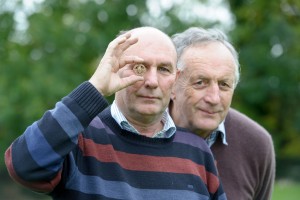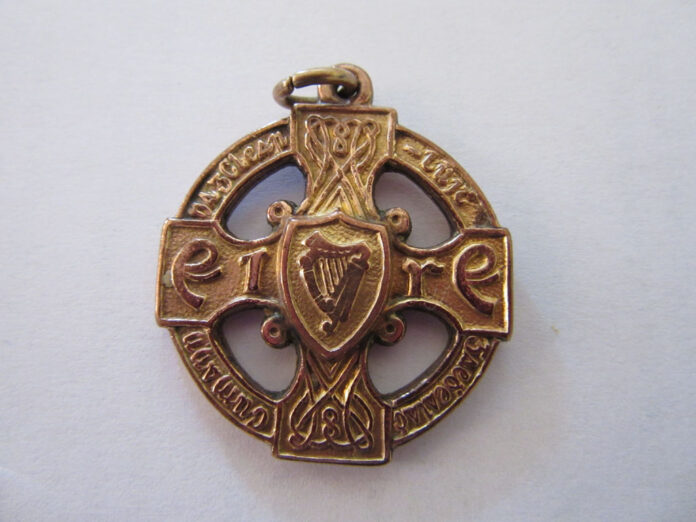2014 marks the centenary of the outbreak of the World War I and Clare’s first All-Ireland senior hurling triumph. These two diverse events have their own historical importance but an interaction between them is highlighted by the story of Newmarket hurler, John Fox.
Fox featured at right half-back on the Clare team that defeated Laois by 5-1 to 1-0 in the 1914 All-Ireland final. A year later, he joined the British Army. He is the only Clare man to have won an All-Ireland senior hurling medal and to have fought in World War I.

Fox later sold his cherished Celtic Cross. His All-Ireland medal was purchased by the late Kevin Keogh from Newmarket. When John Fox died in 1967, Mr Keogh generously returned the medal to the possession of the Fox family from Knocksaggart.
John Fox – The Man
Born in Newmarket-on-Fergus in 1892, John Fox died in June 1967. He was the longest surviving member of the 1914 Clare team.
I, as a youngster around Newmarket-on-Fergus in the 1960s, knew John Fox to see. Like all the hurlers and people of Newmarket, I had a special regard for him, because he was a holder of that All-Ireland medal.
We also fondly remember him leading the parade of the Newmarket team around Cusack Park on county final days in the 1960s.
John Fox – The Hurler
I had the good fortune to speak a number of years ago to John Joe ‘Goggles’ Doyle, who was captain of Clare in the 1932 All-Ireland final. John Joe, while somewhat younger than Fox, knew him well. They both worked for Lord Inchiquin at Dromoland Estate.
John Joe informed me that Fox was a tall, slender, well-built, athletic man over 6ft in height. He described him as having the athleticism of a 440 yards (400m) athlete, who had the ability to vault over a farmyard gate.
Fox’s hurling career was short. He played wing-back in the 1914 All-Ireland winning team. He also played for his club when they won their first county championship in 1912.
An interesting reference regarding a club game from The Clare Champion of March 1915 said, “Fox was as wily as his name suggests and, with a rare turn of speed and clear brain, he has proved himself a master of the game”.
His involvement in the war brought a sudden end to his hurling career. This was because of the GAA’s Rule 21.
Fox and Rule 21
Rule 21, which existed from 1886 to 2007, forbade members of British Security Forces participating in hurling or football. This also meant it excluded Irish men, returning from World War I, from participating in Gaelic games.
On his return from the war, it was no longer possible to participate in Gaelic games. Notwithstanding, it is well known that he did play a game or two for his club.
We also know that he was jeered and abused from the sideline by some of the spectators; comments such as “You took John Bull’s soup” were shouted at him. We also know from talking to his family members that he found such comments to be very hurtful.
He only played the odd game after the war and an examination of the line-outs of Newmarket and Clare teams after 1916 do not contain the name of John Fox.
Fox and World War I
Fox joined the Munster Fusiliers Regiment of the Irish Guards in 1915. Regarding his recruitment, The Clare Journal of July 19, 1915 had a brief note as follows: “John Fox, the well known and popular Gael from Newmarket-on-Fergus, who was on the All-Ireland winning team last year, volunteered for The Irish Guards this weekend and got a great send off on Tuesday evening”.
The enlistment of Fox was regarded as a minor propaganda boost by British recruitment officers. He certainly met the criteria laid down by Lieutenant General Sir Lawrence Parsons when he said he wanted “to see the clean, fine, strong, temperate, hurley-playing country fellows, such as we used to get in the Munsters, Royal Irish, Connaught Rangers.”
Fox fought and got injured during 1916 in the Battle of the Somme and returned to hospital in Dublin. A piece of shrapnel, lodged in his head, was never removed and, according to his grandson, also John, was still lodged in his head when he died in 1967.
Finally, an anecdote told by Fox’s family and others was of an itinerant man, Martin Faulkner, who also joined the British Army at this time. He also survived the war, returned to County Clare and lived the rest of his life travelling the highways and byways and was universally known throughout the county.
The story is that Faulkner carried the injured Fox from the battlefield at The Somme to the safety of a field hospital. But on their way, they were arrested by the Germans who did not detain them. They released them when they realised they were Irish!
It is good that something is being recorded at this time about this man. His story is similar to the other 79 men from Newmarket and the tens of thousands from across Ireland that went to fight in World War I.
These men all went for different reasons – economic, reasons to do with John Redmond and Home Rule, reasons to do with the protection of small nations. Above all, John Fox and these men went for pure and legitimate personal reasons.
At the time, Redmond’s brother, Willie, was the Irish Parliamentary Party MP for East Clare. Redmond spearheaded the call for members of the Irish Volunteers to enlist, hoping this would strengthen the case for later implementing the Home Rule Act. Willie Redmond had been involved in training the Clare hurlers and he led the team onto Croke Park on All-Ireland final day.
It is only now that we, the Irish people, are beginning to remember them and to write their story.
For John Fox and so many others, the war must have brought its own traumas and sad experiences. A man who had hurled for his parish and for his county could not do so when he returned from the war.
Dealing with the changed political environment, post 1916, would have created further difficulties for Fox. Some of his former hurling colleagues became active in the Republican movement, fighting against the British.
According to his grandson, John Fox spoke little or nothing about his experiences in the battlefield.
We all know historically and anecdotally how difficult the war experience is for participants. But, in addition to this, Fox had to cope with a rejection by certain sections of society on returning from the war.
By Con Woods. Con is a retired school teacher. He won a national league medal with Clare in 1977 and won nine senior hurling championships with Newmarket. He is author of the club’s history, A Proud Past.
A native of Ennis, Colin McGann has been editor of The Clare Champion since August 2020. Former editor of The Clare People, he is a journalism and communications graduate of Dublin Institute of Technology.



